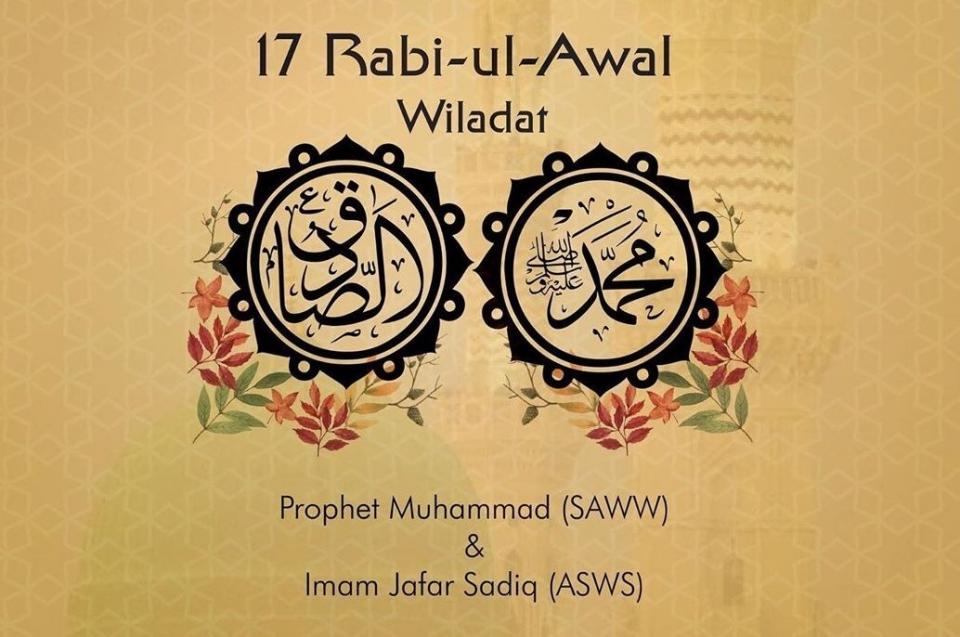Shia Muslims around the world observe the birthday anniversary of Holy Prophet Muhammad (PBUH) and Imam Jafar al-Sadiq (PBUH) on Tuesday, En.abna24.com reported.
Prophet Muhammad (PBUH) was born in about 570 AD in the city of Mecca. He was granted to be the final prophet by Allah at the age of 40. He passed away at the age of 63 after 23 years of disseminating the message of Islam.
Shia Muslims celebrate the birthday anniversary of the Holy Prophet of Islam (PBUH) as well as Imam Jafar al-Sadiq (PBUH) on 17th Rabi' al-awwal and it is an official holiday in Iran, India, Pakistan, and Egypt.
On this day, booths are set up on most streets, offering sweet drinks to passers for free. Households prepare food, known as Nazri, for others as a way of almsgiving. The preparation and the partaking of this food are considered a privilege by believers, moreover, Followers gather in mosques and religious establishments and listen to the orators recounting the virtues of the Holy Prophet of Islam.
Muḥammad b. Abd Allāh b. Abd al-Muṭṭalib b. Hāshim is the prophet of Islam, whose mission was essentially the advancement of monotheism and morality. He was also a social reformist and a political leader. He was the last prophet of God, and his major miracle was the Qur'an.
Although the Prophet was born in the polytheistic society of Arabia, he never worshipped any idols and avoided the inappropriate manners that were rampant in pre-Islamic Arabia. He was chosen by God as a prophet at the age of forty. Although the polytheists of Mecca persecuted him and his followers for many years, neither he nor his followers gave up following Islam. After thirteen years of preaching in Mecca, he immigrated to Medina. This immigration (Hijra) marked what became the beginning of the Islamic calendar. In Medina, he established an ever-expanding community of believers, the Muslim ummah.
Because of the efforts of the Prophet, the pre-Islamic Age of Ignorance ended, and the polytheistic society of Arabia was transformed into a monotheistic society in a short time. Towards the end of the Prophet's life, almost everyone in the Arabian Peninsula had converted to Islam. The number of Muslims has continued to grow ever since, and Islam is now the fastest-growing religion in the world.
The Prophet enjoined his followers to adhere to the teachings of the Qur'an and the Ahl al-Bayt. He designated Imam 'Ali as his successor on various occasions throughout his life, including the event of Ghadir.
Jafar b. Muḥammad b. Alī b. al-Husayn known as Imam al-Sadiq (PBUH) is the sixth Imam of Imamiyya. His Imamate lasted 34 (lunar) years and was concurrent with the reign of the last five Umayyad caliphs and with that of the first two Abbasid caliphs, al-Saffah and al-Mansur al-Dawaniqi. Because of the weakness of the Umayyad rule at his time, Imam al-Sadiq was able to have relatively wider scholarly activities. His companions, students, and those who quoted hadiths from him are said to have amounted to four thousand people. Most of the hadiths of Ahl al-Bayt recorded in Shiite hadith collections are from Imam al-Sadiq.
Despite the weakness of the Umayyads and the requests from the Shi'a, Imam al-Sadiq did not rise up against the caliphate. He rejected Abu Muslim al-Khurasani and Abu Salama, who asked him to become the caliph. He did not take part in the revolt of his uncle Zayd b. 'Ali either and discouraged the Shi'a from getting involved in any uprisings. However, he did not have good relations with the caliphs of his time either, and he had to do taqiyya because of their persecution.
To facilitate his contacts with the Shia, Imam al-Sadiq established the network of wikala (deputyship). The activities of this network continued and increasingly expanded until the end of the Minor Occultation.
The Imam was summoned several times to Baghdad, and thus he traveled to Iraq and also visited Karbala, Najaf, and Kufa. He showed the grave of Imam Ali, which was previously unknown, to his companions.
Some Shia scholars believe that Imam al-Sadiq was poisoned by al-Mansur al-Dawaniqi and thus martyred. He introduced Imam al-Kazim (PBUH) to his companions as his successor, but to protect the life of Imam al-Kazim, he mentioned in his will five people, including al-Mansur, as the executors of his will. After the martyrdom of Imam Al-Sadiq, several sects appeared among the Shi'a, including Ismailis, Fatahiyya, and Nawusiyya.

